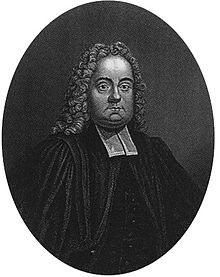Matthew Henry
Matthew Henry (born October 18, 1662 in Broad Oak, Flintshire , † June 22, 1714 in Nantwich , Cheshire ) was a Presbyterian pastor and Bible commentator.
Life
He was born in Broad Oak, a farm on the border between the Welsh county of Flintshire and the English county of Shropshire . A few weeks earlier, on August 24th, after the renewal of the Act of Uniformity from 1559 by King Charles II , his father Philip Henry, along with 2,000 other Puritan clergymen, had lost his pastor in the English state church . Unlike most of his fellow sufferers, Philip had sufficient resources of his own to enable his son to be brought up well. Matthew first attended school in Islington , then began law studies in London at Gray's Inn , but soon turned to theology and in 1687 became pastor of a Presbyterian congregation in Chester . From there he moved in 1712 to a community on Mare Street in the London borough of Hackney . Two years later he died unexpectedly of a stroke on a trip from Chester to London in Nantwich .
The Bible Commentary
Henry's main work is the Exposition of the Old and New Testaments (1708–1710), a commentary on the entire Bible that is oriented towards the needs of practical piety. The author himself commented on the entire Old Testament and the New Testament up to the Acts of the Apostles . After his death, the work was continued by a number of theologians and was first published in full in 1811 by George Burder and John Hughes.
Other works
- Life of Mr. Philip Henry
- The Communicant's Companion
- Directions for Daily Communion with God
- A Method for Prayer
- A Scriptural Catechism
Web links
- Literature by and about Matthew Henry in the catalog of the German National Library
- Online English text of Matthew Henry's Bible Commentary
| personal data | |
|---|---|
| SURNAME | Henry, Matthew |
| BRIEF DESCRIPTION | English Presbyterian pastor and Bible commentator |
| DATE OF BIRTH | October 18, 1662 |
| PLACE OF BIRTH | Broad Oak, Flintshire |
| DATE OF DEATH | June 22, 1714 |
| Place of death | Nantwich , Cheshire |
